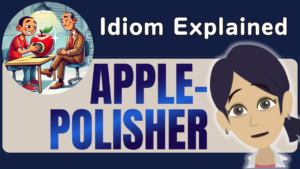Ever wondered why people talk about “buttering up” others when there’s not a stick of butter in sight?
To flatter or praise someone excessively in order to gain their favor or approval.
English idioms can be confusing when taken literally, and “butter up someone” perfectly illustrates this challenge.

If you’ve ever imagined yourself actually applying butter to your boss before asking for a favor, you’re not alone!
This guide will demystify this common expression, explore where it came from, and show you how to use it effectively in everyday conversations.
By the end, you’ll understand both the meaning and the fine line between sincere appreciation and manipulative flattery.
Understanding the Idiom
The phrase “butter up someone” means to flatter or praise a person in hopes of gaining their favor, approval, or support.



Think of ‘buttering up’ as coating someone with compliments – just like spreading butter on bread to make it tastier!
This idiom often carries a hint of insincerity, suggesting someone might be piling on the praise more than they truly feel.
Yet, context matters. In some cases, compliments may be heartfelt, while in others, they can be strategic attempts to achieve a desired outcome.
Myth-Busting Facts
Many English learners wonder if this idiom involves handing over a pat of butter to someone. Naturally, the thought of presenting actual butter at a meeting can trigger comical images.
A common misconception is that the phrase implies a sweet or harmless act. In reality, “butter up someone” often suggests a calculated effort to win favor, which can backfire if the flattery seems too heavy-handed.
This misunderstanding serves as a reminder that idioms rarely match their literal definitions.
Note on Origins
Some say the idiom traces back to an old practice of tossing butter balls at statues of deities in ancient India, hoping to gain the gods’ goodwill.
While this story is widely cited, its authenticity remains debated.
Regardless, the idea of softening someone’s stance with flattering words aligns well with the notion of smoothing something over with butter.
The phrase has endured because it paints a clear picture of making a person more receptive through pleasant compliments.
(If you come across another version of the origin, remember that idioms often shift over time and vary across regions.)
Memorable Metaphor
An easy way to remember “butter up someone” is by picturing how butter adds flavor to bread. You spread a thin layer, and it melts nicely, making the bread more tempting.
Similarly, when you “butter up” a person, you add a pleasant gloss to your interactions—just enough to catch their attention or sway their opinion.
However, add too much butter, and things can turn greasy. Likewise, an overdose of praise can feel manipulative or insincere.
Illustrative Stories
Stories capture the essence of this idiom better than any definition. Below are a few humorous anecdotes that show what can happen when someone tries too hard to butter someone up.
Samantha & the Raise
Samantha believed she deserved a raise and decided that flattery would pave the way. Every morning, she greeted her boss with effusive compliments on outfits, posture, and even penmanship.
Although her boss initially found it amusing, the constant praise soon rang hollow. When Samantha finally requested a pay increase, her boss politely declined, pointing out that genuine hard work speaks louder than hollow tributes.
Tim and the Teacher
Tim disliked studying. He hoped to charm his teacher into awarding him better grades, so he made a show of praising her “excellent fashion sense” during every class.
The teacher noticed his over-the-top comments, particularly since she was wearing mismatched socks one day.
Instead of boosting Tim’s grades, she reminded him that his effort in homework and tests would carry more weight than creative compliments.
Lucy & the Lunch Lady
Lucy wanted an extra helping of dessert in the cafeteria. She praised the lunch lady’s “outstanding culinary talent” at every meal, hoping for a bigger slice of pie.
The lunch lady, amused yet unconvinced, stuck to normal portions. Lucy soon realized that sincerity, not flattery, was key to any lasting favor.
Fun Facts
- Softening Effect
Butter naturally softens bread, which parallels the idea of making someone more agreeable with praise. - 19th-Century References
Written records in the 1800s used “buttering up” to describe efforts to please someone through flattery. - Gift-Giving Customs
In some cultures, butter was occasionally given as an offering, reflecting both its practical and symbolic value. - Political Sphere
Politicians often rely on “buttering up” constituents or allies, proving that this strategy spans cultures and centuries. - Business Context
Successful networking sometimes involves subtle praise, though savvy professionals can spot insincerity a mile away. - Marketing Strategy
Advertisers occasionally “butter up” potential customers with flattery, promising an ideal version of themselves. - Ancient Practices
The notion of throwing butter at statues might be questionable, yet it offers a colorful explanation of how the term could have evolved.
Practical Examples
Below are some ways people use this idiom in everyday contexts. Try noticing how each sentence implies a certain goal or reason behind the praise:
- She tried to butter up her supervisor before the performance review.
- He hoped to butter up the admissions officer during the interview.
- They decided to butter up their neighbors with fresh-baked cookies to ease tensions.
- She attempted to butter up her professor, hoping for a recommendation letter.
- He buttered up his friend’s parents to be seen as a trustworthy houseguest.
In all these scenarios, the key aim is to gain favor. Depending on how it’s received, the gesture can either smooth interactions or come across as forced.
Sincere “Buttering Up”?
Although “butter up someone” implies a certain degree of insincerity, it doesn’t always have to be manipulative. In workplaces, for example, recognizing a manager’s or a colleague’s genuine strengths can foster good rapport.
Still, the line between polite praise and shameless flattery is thin. Those on the receiving end can often sense whether compliments are heartfelt or purely self-serving.
When attempting this idiom in real life:
- Keep your compliments specific and honest.
- Focus on achievements or qualities that genuinely stand out.
- Avoid piling on too many praises at once.
While strategic praise might open doors, authenticity is what ultimately builds trust.
Similar Expressions
Several idioms mirror the spirit of “butter up someone.” They all revolve around flattering words to influence or please another person.
Here are a few:
- Suck Up to Someone
- Meaning: Overly flatter someone in authority.
- Example: “He always sucks up to the manager before deadlines.”
- Kiss Up to Someone
- Meaning: Excessively praise someone for personal gain.
- Example: “She’s kissing up to her coach, hoping for more playtime.”
- Brown-Nose Someone
- Meaning: Act sycophantically to curry favor.
- Example: “He’s brown-nosing the director for a promotion.”
- Apple-Polish Someone
- Meaning: Flatter a teacher or mentor, often in an academic setting.
- Example: “He tried to apple-polish the professor for a better grade.”
- Play Up to Someone
- Meaning: Behave in a way that pleases another, aiming for approval.
- Example: “She’s playing up to her in-laws to make holiday visits smoother.”


Opposite Expressions
In contrast to “butter up someone,” these idioms involve actions or words that are more critical or direct.
- Insult Someone
- Explanation: Speak harshly or rudely to a person.
- Example: “He insulted his coworker’s effort, damaging team morale.”
- Criticize Someone
- Explanation: Express disapproval or point out flaws.
- Example: “She criticized the plan for lacking detail.”
- Offend Someone
- Explanation: Cause someone to feel upset or hurt by words or deeds.
- Example: “He offended the guest with a careless remark.”
- Belittle Someone
- Explanation: Diminish someone’s importance or achievements.
- Example: “She belittled his success, calling it sheer luck.”
- Mock Someone
- Explanation: Ridicule another person in a harsh or playful manner.
- Example: “They mocked him for his unique presentation style.”
Related Idioms
Sometimes, exploring related idioms helps solidify your grasp of a single phrase. Each of these expressions captures a slightly different tone or motive but circles back to the idea of compliments or strategic praise.
- Sweet Talk Someone
- Meaning: Persuade through charming, pleasant words.
- Example: “He sweet talked the receptionist to secure a last-minute reservation.”
- Flatter Someone
- Meaning: Offer praise, often exaggerated, to please someone.
- Example: “She flattered her colleague’s design skills before asking for help.”
- Stroke Someone’s Ego
- Meaning: Boost a person’s self-esteem with compliments.
- Example: “He stroked the client’s ego to close the deal.”
- Lay It on Thick
- Meaning: Overdo the praise, sometimes to a humorous extent.
- Example: “When she said he was a genius, she was really laying it on thick.”
Story Using a Related Idiom
Once, an eager employee named Tom realized he had missed a crucial deadline. In a panic, he decided to sweet talk his supervisor by delivering compliments on her organizational genius and leadership flair.
While his supervisor appreciated the kind words, she also recognized they were a bit over the top. She granted Tom an extension but reminded him that genuine effort and timely work matter more than flashy praise.
In the end, Tom learned that while sweet talk can buy time, it won’t fix underlying issues. This story shows that while similar idioms can be effective in the short term, a more reliable solution involves honesty and diligence.
Pop Quiz: Check Your Idiom Skills
Butter Up Someone

Conclusion
“Butter up someone” means using kind words to win favor—whether for a promotion or someone’s approval. Though it can sound insincere, respectful flattery done right builds real connections.
Here are the key points:
- Definition: Using flattery or praise to win favor.
- Tone: Can carry a negative connotation if the compliments lack sincerity.
- Purpose: Often used to secure a benefit, though genuine courtesy can also involve a mild form of “buttering up.”
- Related Expressions: “Kiss up to,” “brown-nose,” “sweet talk,” and more.
- Opposites: “Insult,” “criticize,” “belittle,” and similar terms.



Be polite, stay authentic, and you’ll speak with confidence and clarity.
👉 Bookmark this post and drop a comment to share your thoughts!









Comment